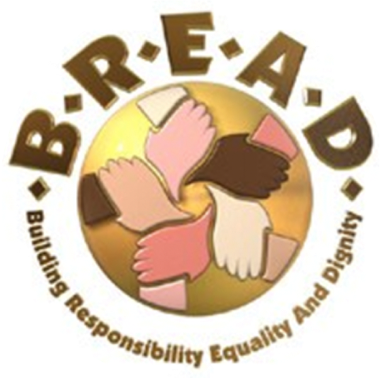Governance and Organizational Structure
BREAD is a fully grassroots organization. Our volunteer leaders govern every aspect of decision making and ensure that our work is powerfully addressing serious community problems. While BREAD maintains paid staff, their role is to facilitate and train rather than set agendas or policy.
Our volunteer leaders oversee BREAD’s work and operations in several key roles, listed below:
Network Members
Network Members are the backbone of our organization because they bring participants to our Nehemiah Action and stay connected within their congregation with the leadership of their Team Member. They share their concerns at a house meeting and if they commit to being a Network Member they help build our people power and attend 4 BREAD Assemblies throughout the year:
- Vote on priorities at Annual Assembly in the fall
- Understand solutions by attending the Rally in the spring
- Bring three participants with them to the Nehemiah Action in May (family members, friends, neighbors, etc.)
- Attend the summer Celebration to build community and consider investing $200 in the work of BREAD (a financial investment is not required)
Additional (optional) opportunities for Network Members:
- Join an Action (Research) Committee
- Attend corporate meetings in support
Team Members
Team members have the following responsibilities:
- Lead their congregation’s Justice Ministry/Rodef Tzedek Networks by hosting a house meeting to listen for problems and build relationships within the congregation.
- Coordinate Justice Ministry Network Members and follow up with them throughout the year so everyone gets personal reminders and ensuring BREAD hears feedback from Network Members.
- Team Members attend the 4 BREAD Assemblies as well as Team Assemblies so they can be trained before each process. There are also planning meetings and opportunities for national training to learn more from other sister organizations in various cities.
Additional (optional) opportunities for Team Members:
- Serve on a Steering Committee during the research process
- Become a Corporate Spokesperson
- Participate in elective roles, e.g. serving on BREAD’s Board
Action (or Research) Committees
During the fall, our Network Members may choose to take on a new problem surfaced during the listening process. To find a solution to these problems requires research, and that is where our Action Committees come in. These committees work to understand the problem, research proven solutions, and identify local decision makers who could implement these solutions. Each congregation should have at least one representative on our Action Committees to ensure that they have a say in the direction of our campaigns.
Any BREAD network member can join an Action Committee, and there are varying degrees of involvement depending on one’s interest or capacity. The minimum requirement to serve on an Action Committee is attending monthly full committee meetings to hear research updates and vote on the future direction of our research and campaign. Additional opportunities include attending research meetings and/or serving on the Steering Committee for that campaign. Please visit the Campaigns page to see a list of our ongoing Action Committees and how to join!
Clergy
Clergy are vital in sustaining a strong Justice Ministry/Rodef Tzedek network in their congregation. Our Clergy “lead from the front” by attending the four major BREAD events, preaching on justice, and identifying potential leaders in their congregation. Clergy are also encouraged to attend our monthly Clergy Caucuses where BREAD clergy gather to build relationships and share ideas on how to develop strong Justice Ministries/Rodef Tzedek Networks in their congregations.
If you are a clergy member interested in attending a Clergy Caucus or learning more about BREAD, please contact us.
Staff
BREAD has a small staff of community organizers that work to build the power of the organization through congregation and leader training, coaching, and recruitment.
Personnel Committee
The Personnel Committee meets after each step in our yearly process to evaluate and ensure the growrth of the organization. This Committee also sets personnel policies and evaluates staff performance to ensure that staff are meeting standards and furthering the mission of the organization.
Finance Committee
The Finance Committee is responsible for proposing the organization’s yearly budget, supervising all fundraising activities, and advising the Executive Committee and Board of Directors on the financial condition of the organization. The Treasurer serves as an ex-officio member of the Committee and provides a report at each BREAD Board meeting in addition to an annual report.
Board of Directors
The Board of Directors is made up of representatives from each member congregation of BREAD. The Board is the decision-making body of the organization and votes to approve key policy changes as well as agendas for each major BREAD event. Board members also ensure that their congregations are kept informed of decisions made by the Board.
We strive to have the Board represent the fullness of diversity found in our congregations and our community. If you are a team member and interested in serving on the Board, please talk to your organizer!
Executive Committee
Members of the Executive Committee are nominated and then approved by Network Members during our Annual Assembly in the fall. The Executive Committee consists of two co-presidents, a vice president, a corresponding secretary, a recording secretary, and a treasurer, as well as 2-4 “at-large” delegates elected by the Board.
The Lead Organizer reports directly to the Executive Committee and meets with these members regularly to provide updates on the objectives and operations of the organization. The Executive Committee may also introduce motions to the Board for their consideration and vote.
